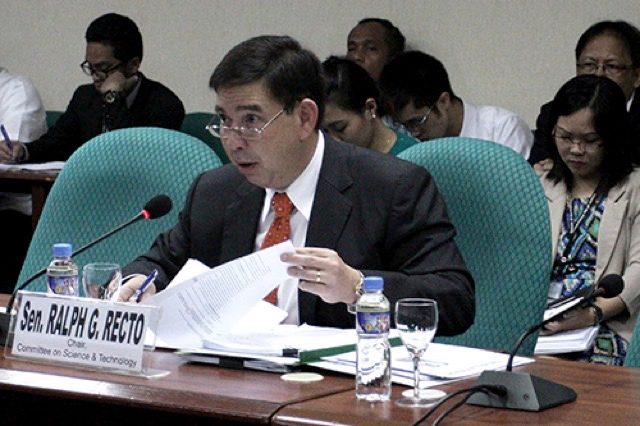SUMMARY
This is AI generated summarization, which may have errors. For context, always refer to the full article.

MANILA, Philippines – Senate President Pro-Tempore Ralph Recto said that rechanneling the unutilized parts of the national budget to health projects and programs can be an effective cure to the government’s underspending problem.
“If money is not optimized in projects which are slow-moving, then shift it to the sick who need money for fast-acting [cures],” Recto said in a statement.
“Walang absorptive capacity issues sa may sakit (There are no absorptive capacity issues concerning the sick),” said the senator.
According to him, the Department of Health (DOH), the Department of Social Welfare and Development (DSWD), and local government units – which run provincial, district, and municipal hospitals – have already put in place mechanisms to handle funds that can be given as direct aid to indigent patients. (READ: ‘Tsekap’: Philhealth has new benefits for indigents)
Recto said the money can also be used to augment the purchase of medicines and hospital equipment. “For example, in public hospitals, there’s a shortage of chemotherapy drugs, dialysis machines. In wards, the buy-your-own-dextrose rule prevails.”
“I’m not saying that health should be the default recipient of stuck-up funds. My prescription is to shift maybe a portion of hard-to-obligate allotments to health because there are waiting, deserving, visible recipients who can spend these fast,” he added.
Insufficient spending
Because of the continued underspending of the Aquino administration in the first quarter of 2015, the budget deficit of the national government fell below target by 66%.
Data released by the Department of Finance on May 25 showed that the deficit in the first quarter stood at P33.5 billion ($751.64 million), P64.6 billion ($1.45 billion) lower than the P98.1-billion ($2.2 billion) target for the period.
According to Recto, the government also underspent by P104 billion in 2013 and by P62 billion in 2012.
While a bigger portion of the 2015 national budget has been allocated for health, Recto thinks actual spending for it has been insufficient.
“The government health spending this year is about P2.36 per person per day,” said Recto. “Kulang sa dami ng nagkakasakit (It’s not enough to accommodate the number of people who get sick).” (READ: World Bank: 400M still lack access to key health care services)
“Two Filipinos die every hour from heart disease, 5 from pneumonia, 2 from diabetes, and 3 from TB. For diarrhea, 27 get sick every 60 minutes, while 59 are rushed to ERs for hypertension. Meanwhile, one person gets infected by dengue every 12 minutes,” said the senator in a mix of English and Filipino. (READ: #SONA2013: The state of public healthcare in the Philippines)
According to Recto, for every peso spent by a Filipino on health, the government contributes about 19 centavos, social insurance provides 11 centavos, and the individual dips from his or her own pocket about 57 centavos.
“So if [the] government is asking where it can put money which can be spent quickly, then the answer is quite obvious: Give to the sick, and that will also cure underspending.” – Rappler.com
Add a comment
How does this make you feel?
There are no comments yet. Add your comment to start the conversation.